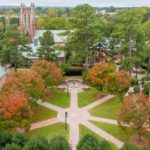6 Political Science Extracurriculars for High Schoolers
What’s Covered:
- 6 Extracurricular Ideas for Aspiring Poli-Sci Majors
- How Do Extracurriculars Impact Your College Chances?
Political science majors can find employment in a wide range of fields, including journalism, law, marketing, education, and diplomacy. Because of the marketability of a poli-sci degree, admission to schools with prestigious programs can be competitive. To get into a selective school, you should build a strong applicant profile while you’re still in high school.
When choosing which extracurriculars to pursue in high school, it’s important to think about your long-term goals. To that end, aspiring poli-sci majors should focus on extracurriculars that exhibit communication skills and efficient problem-solving.
Read on to learn about the different tiers of extracurricular activities and which poli-sci extracurriculars are most likely to gain you admission to a prestigious program.
6 Extracurricular Ideas for Aspiring Poli-Sci Majors
1. Clubs
Clubs are an obvious choice when it comes to extracurricular activities. Students are drawn to clubs primarily because of the community they provide.
Popular clubs for aspiring political science majors include:
Debate Team
Joining the debate team will help you learn how to take positions on topical issues and support your positions with detailed evidence. This is what political science is all about. You will delve into ethics, philosophy, and logistical implications of policies.
Mock Trial
Mock Trial is a great way for students who ultimately plan to pursue a career in law to show their dedication to their future goals. Mock Trial students learn how to effectively communicate arguments, use time efficiently, and perform thorough research. Additionally, you will learn the ins-and-outs of legal processes and criminal justice processes that are the foundation of politics.
School Newspaper
Joining School Newspaper is a good option for students interested in journalism or political office. If you are interested in running for political office one day, you can write opinion pieces where you take stances on local events. If you are interested in political reporting, you can edit the current events column.
Coalition Z
Coalition Z is a peer-to-peer network that connects high school and college students with elected officials and progressive organizations with the goal of engaging young people in politics and bringing about change. This is a great opportunity for students interested in social issues and activism.
Junior State of America
Through Civic Education and Engagement, JSA strives to teach leadership and critical thinking while encouraging students to promote the public good. Students plan and execute conventions, conferences, and political-awareness events. Goals include fighting apathy, holding political fairs, registering new voters, and increasing midterm voting rates.
Other clubs that your school may offer:
- Criminal Justice Club
- Law Club
- Philosophy Club
- Young Democrats
- Young Republicans
2. Model Government
If you are specifically interested in public office and diplomacy, you should consider joining a group where you can learn about government proceedings.
These are the four most popular model government programs:
Model Congress
Students who participate in Model Congress act like representatives and senators in order to solve challenges and learn congressional procedure. As the longest-running program of its kind in the U.S., Model Congress helps students learn research skills, public speaking, negotiation, and more.
During the multi-day conference, participants can expect to engage in writing bills, voting on legislation, and running for leadership. Learn more about this activity on the CollegeVine blog.
Model United Nations
This activity invites high schoolers to gather together and simulate UN proceedings. During regular meetings throughout the year, participants will master their skills in diplomacy, negotiation, and public speaking. Then, they’ll have the opportunity to simulate a UN General Assembly.
The goal is to discuss and debate important issues facing people around the globe and work with “allies” to draft resolutions. Learn more about why Model UN is the ideal EC for poli-sci and international relations majors.
We the People Club
Created by the Center for Civic Education, We the People hosts state and national mock congressional hearing competitions for American high school students. During national finals, students testify as constitutional experts with History and Poli-sci professors serving as the panel of judges acting as congressional committees.
Youth and Government
Sponsored by the Y, Youth and Government invites high school students from around the country to participate in state-organized model government and shape public policy.
Members have the opportunity to serve as state delegates, debate issues affecting their state, and propose and discuss bills on the floor of the legislature. The goal is to train future public servants to prioritize policy over politics.
3. Internships
There are many internships offered for students interested in politics, with the Senate Page Program being the most prestigious. Senate Pages are sponsored by individual Senators, so your application process is state-dependent:
- Alaska — Lisa Murkowski Senate Page
- New Hampshire — Maggie Hassan Senate Page
- Ohio — Sherrod Brown Senate Page
Additionally, there are State Legislature Page programs:
- Alabama — Alabama House of Representatives Page Program
- Florida — Florida House of Representatives Page and Messenger Program
- Georgia — Georgia General Assembly House Page Program
For more information about becoming a page, look on your state legislature’s website. You must be a resident of a state to be selected as a student page in that state.
If becoming a page sounds too time-intensive to you, there are other political science internship opportunities available to you. For example, the Pasquines Internship is great for students interested in news and media. The Political Research Associates (PRA) Internship Program is great for students interested in research and advocacy.
Check out our list of 20 Political Science Internships for High Schoolers in 2023 for more.
4. Summer Political Science Programs
Political science summer programs can be very appealing to admissions officers, especially if students participate in selective and rare programs. Programs are offered through colleges and universities, government organizations, and nonprofits.
Some popular programs include:
Telluride Association Summer Seminar
Location: Cornell University, University of Maryland, and University of Michigan
Length: 6 weeks
Cost: Free
This highly-selective seminar teaches students the value of critical thinking and democratic community over six weeks at one of three prominent universities. Students can apply in one of two areas of study: Critical Black Studies or Anti-Oppressive Studies.
Burd Institute on Media & Politics
Location: Los Angeles, CA
Length: 1 week
Cost: $1895 (in-person) or $295 (virtual)
Through the Burd Institute, offered by the Junior State of America, students are introduced to the complex relationship between media and politics. Students participate in discussions, complete projects, write editorial content, and create political communication plans.
National Student Leadership Conference on Political Action & Public Policy
Location: Washington, DC
Length: 2 weeks
Cost: $3,695
This summer program focuses on model government as students run a mock Presidential campaign. Important politicians, political experts, and political advisors help students in this effort. It is a great way to learn the intricacies of the political process while meeting professionals and like-minded students.
Programs offered by colleges and universities include:
- Georgetown University American Politics Academy
- Emerson Politics, Activism, and Leadership Institute
- George Washington University | The U.S. Intelligence Community and Counter-Terrorism
- UCLA Political Science Summer Institute
- Columbia Summer Immersion Program
- USC International Relations Summer Program
5. Summer Leadership Programs
In addition to political science programs, students interested in political science may want to look into summer leadership programs.
Some competitive leadership programs include:
FBI NAA Youth Leadership Program
Location: Quantico, VA
Length: 6 weeks
Cost: Free (with stipend)
This unique program is hosted by the FBI National Academy Associates. Students in this program engage in extensive coursework and instruction focused on the issues facing today’s youth and their individual talents.
Bella Abzug Leadership Institute Summer Program
Location: New York, NY
Length: 2 weeks
Cost: Free
This institute is for female-identifying and gender-expansive youth. During the program, participants meet female leaders, learn the skills needed to win debates and influence audiences, and participate in a series of leadership-building workshops.
Bank of America Student Leaders Program
Location: Various internship locations, culminating in a week-long summit in Washington DC
Length: 8 weeks
Cost: Free
This program provides high school students with experience working with nonprofits as interns. Students commit 35 hours each week to their nonprofit work. The program ends with a week-long summit in Washington DC where interns from across the country come together to see first-hand how nonprofits, governments, and businesses interact at local and national levels.
Subiendo: The Academy for Rising Leaders
Location: Austin, TX
Length: 5 days
Cost: Free
Subiendo is a competitive program hosted at UT Austin for rising juniors and seniors in high school. The program introduces students to the McCombs School of Business through leadership seminars, case studies, campus visits, and tours with current students.
Some less-selective (and often more expensive) programs offered by colleges and universities include:
- Brown University Leadership Institute
- University of Notre Dame Leadership Seminars
- University of Pennsylvania Wharton School – Leadership in the Business World
- Yale Young Global Scholars
- Cornell: Inspiring Leadership
- Leadership Academy at Stanford
- Barnard College Young Women’s Leadership Institute
- Tufts Leadership for Social Change
6. Volunteering
Volunteering is a great way to give some depth to your interest in political science by showing that your goals are rooted in a care for humanity and a desire to advance society.
That said, make sure the organization you volunteer with is specifically invested in politics, not just the greater good. While your compassion for homelessness, food insecurity, or the environment may be a part of your desire to become a politician, as a politician, you will need to care about all of the major issues.
Some places to volunteer:
- Political campaigns
- Non-profits
- Public policy groups
- Human rights advocacy groups
- Ethics groups
- Diversity initiatives
To discover specific opportunities, reach out to your local government office, likely the mayor’s office. While you won’t speak directly to the mayor, these types of organizations often make the mayor’s office aware of their needs.
How Do Extracurriculars Impact Your College Chances?
Grades and test scores are important factors in the college admissions process, but admissions officers are also interested in who students are beyond the numbers. This is where factors like extracurriculars, personal essays, and recommendations come into play. Through extracurriculars, students can show their specific interests and, more importantly, their dedication to specific interests.
Because of the importance of dedication, our CollegeVine team recommends that students focus on 2-3 extracurricular activities that they care deeply about. If your extracurricular list shows breadth rather than depth, your admissions officer might not understand how truly dedicated you are to the field of political science or to your future goal of becoming a lawyer, journalist, or diplomat.
Additionally, admissions officers often group activities into one of the four tiers of extracurricular activities. The highest tiers—Tier 1 and Tier 2—have the most influence on college admissions and are reserved for the rarest and most distinguished extracurriculars. Lower-tier activities—those in Tiers 3 and 4—are less well-known, less distinguished, and ultimately have less of an impact on college admissions.
For example, an admissions officer is going to be more drawn to a student who was on the national board of JSA and did an internship in Washington during the summer—activities in Tiers 1 and 2—than a student who was a general member of their school’s criminal justice club—an activity in Tier 4.
As you choose your extracurriculars, think about what will stand out to admissions officers and what will showcase your dedication to the field of computer science. Additionally, put your extracurriculars into CollegeVine’s free chancing engine, which will tell you how specific extracurriculars will affect your admissions chances at specific colleges and universities.



